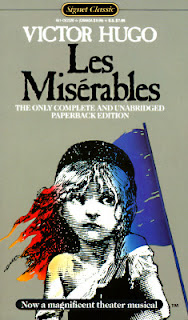"Have no fear of robbers or murderers. They are external dangers, petty dangers. We should fear ourselves. Prejudices are the real robbers; vices the real murderers. The great dangers are within us. Why worry about what threatens our heads or our purses? Let us think instead of what threatens our souls."
- Charles Myriel a.k.a. Monseigneur Bienvenu, The Bishop of Digne (I.1.vii)
Day Count: 4
Page Count: 32
Beginning anew is a task that is always as fraught with peril as it is filled with excitement. One year ago, I was wading into War & Peace and feeling quite good about it. This year, I'm beginning my read-through of Victor Hugo's immortal classic Les Misérables and feel just as good about it. While my schedule doesn't allow me quite the brisk pace I was enjoying at this time last year (I was not in a play last January, nor did the break end so abruptly last year), I am still getting a great deal of enjoyment from the text.
Hugo is starting slow. After taking a brief stock of the first volume, I recognize that Valjean - the book's main character - doesn't appear until about 60 pages into the book and Fantine - the title character of the first volume - doesn't appear until page 120. Clearly, he is taking his time and allowing the drama to unfold organically, not rushing exposition. I'm looking forward to going wherever he has to take me!
For my journey this year, I've decided to go with the Signet Classics paperback version of Les Mis, which offers a 1987 English translation by Lee Fahnestock and Norman MacAfee. This translation is actually based on what is considered the 'classic' translation by Charles Wilbour with some updated language and a bit closer attention to certain details Wilbour had managed to ignore. I chose this translation for a few reasons:
- Proximity of Translation to Today - I've heard it said (and pointed it out previously) that a good translation is one that makes the text accessible to its reader in a language that (s)he understands. While the Fahnestock/MacAfee translation isn't the most recent, it is - based on the reports I've read - the most reliable of the recent translations. It was released around the same time as the musical version of Les Mis (of which I am a fan), so it's got that going for it as well.
- The Ease of Portability - Generally speaking, I do not like mass market paperbacks at all! They are generally very cheaply made, tend to fall apart, and don't look nearly as nice on a bookshelf as I feel books ought to. However, this translation (read: the one I wanted) was only available in mass market, which does offer one very nice perk: portability. While the book is a good two inches thick, it is a lot smaller than my copies of War & Peace or Anna Karenina, so toting it around from place to place (as I am wont to do) will be much less of a burden. So there's that...
- In a Word... Unabridged! - Since announcing my Year of Hugo on Facebook (again) a scant two hours ago, I've had at least two friends advise against reading the unabridged version of Les Mis this year. I must admit that this is tempting and I would probably give in to said temptation... had I not already read War & Peace. Reading that book changed my perception of literature such that I have absolutely no fear of tackling even the epic task of a book which exceeds my other great reading exercise by about 250 pages.
I'm looking forward to another great year of reading another of the greatest novels ever written! Here's to a great 2012!

